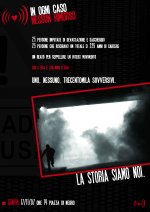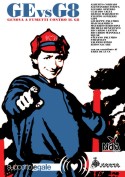

astasiempre - l'asta
Cerca
Navigazione
GLF e Segreteria Legale
Press release] Diaz Trial: Decrees and Judgments
Two months after the beginning of the trial about the Diaz events, court president Barone has issued a decree according to which from now on judges will only listen to witnesses with new evidence or with evidence which has not been admitted by the court yet -- provided that other witnesses can be examined as regards their injuries.
We find this decision a dangerous conundrum. It will affect a four-year inquiry, hundreds of plaintiffs, international rogatories, 29 defendants belonging to the highest ranks of the police forces stationed in Genoa during the G8 meeting; it will affect a trial some defined a "trial against the police" with accusations of personal injuries, forgery, and slander.
Restricting witnesses hearings would mean preemptively deciding which accusations make sense and which do not. For us, understating or even hiding some evidence, with a decree which is apparently treating this trial like an ordinary brawl trial, means seriously wronging 93 individuals who were arbitrarily arrested as well as 63 people who suffered a personal search carried out with truncheons -- the victims who are coming to Genoa to recount in front of the court their experience ,
which was not just an arbitrary punch up with the police forces, and to reconstruct, as much as is possible in a court house, that night of July 2001.
This simplification of the trial -- or perhaps the decision not to give the deserved attention to the terrible stories we are listening to week after week -- is one of many possible ways to distract the public from the area of police forces, which is a fundamental issue in the pre-elections period, but it could also aim at the more general target of forgetting the G8 in Genoa together with its legal consequences.
But we do have an objection against this decision. In cases like this, wariness is a gift. We would like this decree to be a sort of pre-sentence of perjury and slander, while postponing the investigation over personal injuries. But we believe that it actually aims at minimizing the political and historical value of this process, rather than trying to issue a quicker verdict considering all evidence told by every single victim and plaintiff.
We are looking forward to receiving a memorandum by the plaintiffs' lawyers; meanwhile we want to censure today's decree as one of many potential attempts at defusing the possibility of obtaining a public reconstruction of the Diaz events.
La Storia Siamo Noi




